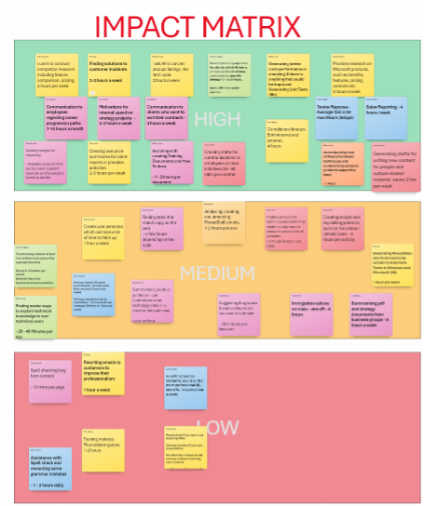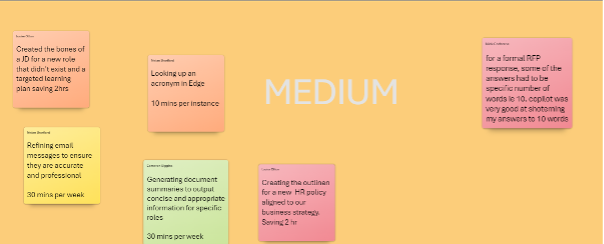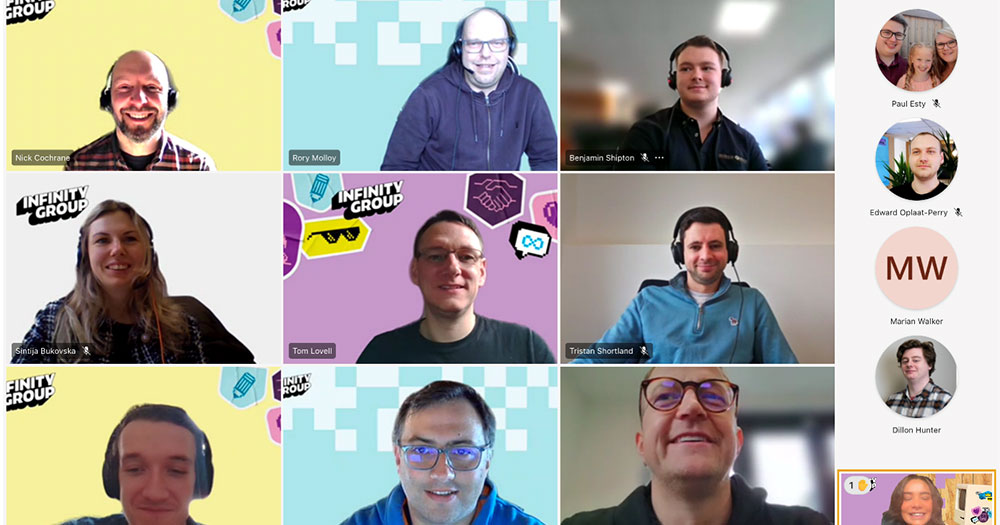For the last few years, AI has been everywhere. And there are no signs of it disappearing any time soon.
As such, many organisations are implementing it into their operations, hoping to reap significant timesaving and cost-efficiency benefits promised. Those that aren’t already are considering how they can utilise AI before they fall behind the trend.
However, adopting AI isn’t always simple. Research from Gartner found that businesses face tough barriers when embedding AI, such as:
- A lack of skills among staff currently
- Understanding the benefits and use cases of AI
- Measuring the value of AI internally
- Finding a starting point for AI adoption
We faced these obstacles at Infinity Group. In order to tackle it, we launched an AI advocacy initiative, aiming to increase adoption across our teams and uncover the potential benefits.
We’ve put together this case study to show you how we approached our AI journey and what we’ve learned over the last few months.
Why we started the AI advocacy initiative_
As a Microsoft partner, we’re regularly talking to our clients about AI. The more we had these conversations, the more important it became that we understood the impact of AI within our own teams. We firmly believe that AI is going to become increasingly embedded into our lives, so we wanted to get ahead of the curve and find practical ways to introduce it into the business.
Plus, like most other businesses, we’re always searching for more hours in the day. So, we were extremely interested to find out whether AI could bring the time-saving benefits that are so often promised.
Nick Cochrane, Head of Innovation at Infinity Group, led the charge: “We know AI is an amazing innovation, but we didn’t have a good grasp on how we could use it as a business. We had some anecdotes of people using it effectively, but we had no idea how different roles were leveraging it and at what scale.”
Nick put together the AI advocacy group to change that, by bringing people together regularly to share AI use cases and results.
Using Copilot as our central tool_
When setting up the initiative, we quickly decided to use Copilot as the tool to experiment with.
As a Microsoft Partner, this would allow us to gain first-hand experience with their flagship AI tool, which would help us to better advise our clients.
But beyond this, we knew Copilot was the safest option for our business. Unlike some other AI tools, the data shared with Copilot is protected and never publicly shared. It meant our staff could freely use it, without the fear of data or business information being leaked.
Plus, Copilot could easily integrate with the other Microsoft products we already use across our operations, enabling us to identify more use cases and reap the benefits.
Our methodology_
The AI advocacy group acts like a fortnightly workshop, giving members a forum to discuss the ways they’d used Copilot and raise any obstacles.
It was crucial that the group represented every area of the business so we could get a full picture of how AI could support our teams. So, we signed up volunteers from every department, who would represent their team in the session.
For the initial phase of the group, we used the free version of Copilot. Every member had access to this, allowing them to experiment and come to each session with examples to share.
Using a free tool also meant we could identify value and define our use cases before investing in a paid licence, so we had a clear benchmark for ROI.
Each session has a specific theme, giving people a focus to test Copilot and allowing us to experiment in different areas. Group members are given the themes in advance and encouraged to come to the session armed with their findings.
Initial sessions focused on the ways people had previously used AI within their roles. Later sessions have handled potential use cases for custom Copilots, how to tackle customer pain points with AI and how to perfect prompts for better outcomes.
During each session, team members write their Copilot use cases into Whiteboard. They also rank them based on how impactful they are.

Extending beyond the AI advocacy group_
The AI advocacy group has given members a devoted space to discuss Copilot and brainstorm ideas. However, we wanted everyone in the business to feel included. This would help us to improve adoption company-wide.
Ahead of each session, members are encouraged to discuss their AI use cases and ideas with the rest of their team. While only one person per department currently attends the sessions, this gives us greater visibility of how AI can impact whole teams.
We also continue to hold company-wide sessions to spread the findings of the group. This includes regular lunch and learns, open to the whole of Infinity Group. This gives employees outside of the working group a chance to learn about helpful use cases, allowing more people to leverage AI and reap the benefits.
The benefits we’ve gained from Copilot_
It’s only been a few months since the AI advocacy group first began, but we’ve already seen significant results.
On average, every member of the advocacy group has saved 4.2 hours per week, amounting to a huge five weeks saved per year. This amounts to £3911.93 saved per person, per year in productivity-related costs.
These results have come from only a sample group. If we were to open it up to every employee at Infinity Group, we predict even greater savings, with 1140 hours saved per week and an ROI of £48,899.14 per month.
While these results alone make Copilot worthwhile, group members have also experienced the personal benefits.
Louise Otton, Head of People and Culture, has been part of the AI advocacy group since the first session. She’s experienced the rewards already, stating: “My team can move quicker by being able to create something from nothing through Copilot. It helps us work through different scenarios and move towards fast resolutions. It’s been amazing to hear how other people are using it and pick up tips we can benefit from”.
One of the most significant takeaways has been a shift in attitudes. In the initial sessions, Nick observed that some people felt reluctant to share their AI uses, almost seeing it as ‘cheating’. However, as the group has developed, people are actively excited to talk about AI and use it regularly.
Chloe Buswell, Housing Marketing Manager and a member of the AI advocacy group, said: “I’m definitely using AI more, and most importantly I know I’m working for an organisation where it’s welcomed. We’re encouraged to share our work with AI rather than feel guilty about it”.
With many businesses struggling with people using AI without consent, leading to shadow IT risks, our AI advocacy efforts are also keeping us safe. It’s encouraged people to embrace it, using secure tools, and to share their tips with others for improved performance across teams.
Our next steps for improving AI adoption at Infinity Group_
The AI advocacy group will continue to run, with each session bringing new discussion and Copilot use cases.
To date, only the free version of Copilot has been used. However, based on the savings, a paid licence would pay for itself in 12.2 days.
So, knowing we’ll confidently get ROI, our next step is to purchase a small number of Copilot licences to understand what additional capabilities and benefits this drives. Once we begin to identify the value, we’ll look to increase our licences over time so more colleagues benefit.
We’re also considering use cases for customised Copilots, built through Copilot Studio. This will allow us to leverage and tailor the power of AI to better serve internal needs.
Most importantly, we want to continue to experiment. With the success the AI advocacy group has had so far, even AI-averse members have warmed to Copilot and found rewards.
As we carry on testing AI and sharing the benefits, we expect more people to follow suit. This will to improve the productivity and cost results we experience as an organisation even further.
Our key takeaways for other organisations looking to adopt AI_
We’ve learned a lot in the last few months since the initiative started! If you’re considering how to drive AI adoption in your business, these are our top tips:
1. Find your AI tool kit_
Currently, there are countless AI tools on the market that might be relevant to your business. You need solutions that fit your needs and genuinely add value, while keeping your organisation secure.
We chose Copilot because we know it would work with our existing Microsoft infrastructure, plus provide privacy over our internal and customer data. However, it’s crucial to find the AI that works for you.
Spend time researching your options to find the best tools for your needs
2. Ready your data_
If your organisation has unstructured data, without adequate labelling or protective measures, there’s a risk that AI can leak it to the wrong people.
OpenAI models learn from your data and may share it when generating answers for the public. As a result, your competitors can gain knowledge on your company you’d rather they didn’t see, plus there’s the risk of breaching confidential customer data.
Even if you use AI that is private to your organisation, there’s the chance it could share information to the wrong teams. For example, employees could gain access to private pay information.
Spend time labelling and protecting your data adequately so nobody sees something they shouldn’t.
3. Make AI part of your policy_
With concerns over AI, many businesses have made the mistake of outlawing it. Some simply don’t discuss it at all, leading to culture where people feel they need to hide their AI use.
The truth is, whether you allow it or not, people will use AI. It’s better to take control of it, by encouraging usage toward your preferred tools and crafting careful policies to govern usage.
Make sure people are aware of the tools they can use and the best practice for using it – including avoiding sharing confidential data!
4. Start small and scale_
With any new initiative, it’s best to start small while you adjust to the change.
If you are creating your own AI working group, it’s ideal to involve just a sample of employees while you begin to experiment and define use cases. You can then share your findings to bring more people in the fold, gradually increasing use.
Similarly, we suggest starting with a free tool or investing in a small number of paid licences. This enables you to understand the value early, before you build a business case for AI and warrant wider investment.
5. Get different voices involved_
Different teams will have different ways of using Copilot. That’s why we suggest getting a range of perspectives involved in your AI exploration, ideally representing teams across your business.
This will enable you to identify a diverse range of AI use cases and examine the benefits across your operations. It’ll also help you to understand people’s difficulties and concerns about AI, so you can tackle them effectively.
6. Record your results_
As you experiment with AI, remember to record your wins and challenges. Use a spreadsheet or document to capture this. We stored ours in Whiteboard.
We also recorded the results we experienced, such as time saved per use case and any other benefits.

Over time, this will allow you to pinpoint your use cases and design a long-term strategy. It will also make it much easier to share your successes with the rest of the business.
Want to harness the AI power of Copilot for your business?
Our AI Readiness Assessment has been created to identify how prepared for business is for AI.
During the assessment, our experts will look at areas where Copilot can add value to your operations, as well as any data risks you need to address. Then, you’ll gain an actionable roadmap for effectively implementing AI in a way that reduces risk, provides results and encourage adoption.
This allows you to build the right foundations for AI implementation and secure faster results.





